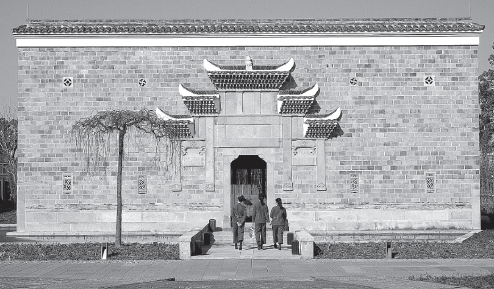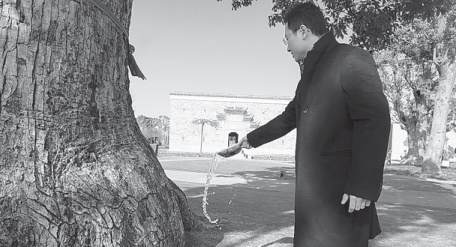DepthReading
To preserve the past

Traditional Chinese homes are quickly vanishing from the landscape as China's drive toward modernity gains pace, and experts say that everyone has a role to play in ensuring that heritage architectures do not go extinct
For most people, the Chinese New Year is a period of family reunion and feasting. For Ma Dadong, the New Year of 2002 had another significance - it was life-changing.
During his holiday back home in Jiangxi province, Ma - he was then living and working in Shanghai - learned from the locals that the authorities were planning to build a 15-square-kilometer reservoir in vicinity of the village where he was born in order to prevent flooding and generate electricity. The project would involve cutting down thousands of ancient camphor trees and removing hundreds of traditional residences.
"In Shanghai, buildings that date back to a century are listed as historical artifacts. These trees and houses that were about to disappear were much older than that," said Ma in a Discovery Channel documentary.
Such was his determination to preserve this piece of heritage that he sold his advertising agency in 2002 in order to fund the project to relocate some 10,000 trees and 50 houses from Jiangxi to Shanghai.
Along the way, Ma discovered that many people were chucking away their silkwood furniture when their old houses were demolished. He then decided to recycle these discarded products and manufacture furniture using recycled silkwood. The profits from this secondary business has since been used to support his main goal.
In 2009, Adrian Zecha, the founder of luxury hospitality brand Aman Resorts, learned about Ma's ambitious project and decided to partner with him to establish the brand's Shanghai outpost - Amanyangyun.
Earlier this January, Amanyangyun Shanghai - it means "nurturing the energy of the clouds" in Chinese - held its soft opening. The new hotel stands out in Aman's portfolio as the brand's largest project with 77 rooms. Aman hotels typically have no more than 55 rooms. Amanyangyun also stands out in terms of price point - with room rates ranging from 6,000 to 80,000 yuan per night ($950 to $12,700), it is the most expensive hotel in China.
The hotel's management team told China Daily USA that its occupancy rate has already been "exceptionally high". Most of the current occupants belong to Aman Junkie, an elite group of jetsetters who travel from one Aman resort to the other for their getaways.
"Shanghai, if not China as well, may be filled with outlets of literally every luxury brand in the world, but there is still little chance to stay in an antique Chinese house," said Tang Yu'en, chief architect of Shanghai Architectural Design and Research Institute, which is responsible for the restoration of the old houses that are part of the project.
Occupying 18 hectares in Shanghai's Maqiao Village, a suburban area where Ma first replanted the trees uprooted from his hometown, the estate comprises five restaurants and bars, nine tea rooms and 13 villas, each featuring four rooms split between an old house and a contemporary annex. The rest of the guest rooms are located in newly-built houses.
Several Chinese media have speculated that the decadelong project would have cost Ma a whopping 3.3 billion yuan. Neither Ma nor Aman have commented on the actual amount spent.
Besides raising eyebrows over the price of their rooms, Amanyangyun has also reignited debate over whether antique houses should be repurposed for commercial use.
"It's beyond question that traditional Chinese houses are rapidly vanishing. I don't think the process can be reversed or even stopped. The most critical task now is determining what we can do with those still left, and I think every proposed solution is worth a try," said Tang.
Today, China's urbanization drive has meant that old houses are quickly being replaced by modern high-rise apartment compounds. In Jiangxi province, one of the regions in China that has the highest density of traditional architecture, more than half of the registered old buildings have been demolished between the two nationwide cultural relics surveys in 1983 and 2012, according to Jiangxi Morning Daily.

In recent years, Chinese governments have hastened the pace at which dilapidated houses are preserved. In Shanghai, the municipal government is determined to add more houses to the list of protected heritage buildings by introducing "architecture census" to those that have been standing for more than 50 years.
While there is no official rule as to how old a traditional house has to be in order to be considered an antique, Zhang Kegui, a researcher with the Palace Museum's Research Institute, said that any building that is made of wood and dates back to 1911 - the year that the Republic of China was established - should be used as the benchmark.
Zhang noted that the central government had during the 11th five-year plan (2006-10) period increased the budget allocated to the preservation of houses from 2 billion yuan in 2006 to 20 billion yuan in 2010.
"Money should be the last concern when it comes to a conundrum like this. When we are talking about protecting and preserving antique houses, we are not only talking about the houses per se, but also the craftsmanship and skills of carpenters and handymen that make the preservation possible," said Zhang at a forum titled the Application and Preservation of China's Old Houses and Intangible Culture Heritages.
Organized by Qin Tongqian, the two-day forum gathered a dozen experts and scholars to explore the possibilities of reusing and recycling in a cost-effective manner.
Like Ma, Qin has turned his personal collection of antique houses and furniture into two luxury hotels by partnering with a professional hospitality management company. The business tycoon, who made his fortune by building villa gardens for wealthy individuals in Shanghai, boasts a collection of more than 600 old houses and more than 10,000 pieces of furniture. However, he lamented that most of his possessions have remained unused.
"I have devoted almost my entire life to the collection of these antiques, but my biggest worry now is that my collections are going to collect dust," said the 53-year-old, who added that the investment ploughed into his two hotels has already exhausted most of his fortune.
"The responsibilities of preserving old houses should never fall on one individual or institution. It involves every person living in the country and every government department," said Zhou Heping, former vice minister of culture, at the forum.
He elaborated on this point, saying the government can look into initiatives such as reducing taxes for corporations that are engaged in preservation projects, introducing this topic into the school syllabus, and providing owners of old houses with subsidies so that they can upgrade their living environment.
"I started collecting all this stuff without any idea about the importance of preserving or protecting them. I did it only because I like them," said Qin. "But I think my passion and fondness for them has a root - I grew up in them. In today's context, however, if we don't protect them, the younger generation won't even have a chance to be exposed to them, let alone like or preserve them."
One positive sign seen by his team is that people born after the 1980s make up 80 percent of the guests at both his hotels since they were opened in 2016.
"China should not only have the Forbidden City or Summer Palace that can stand out in the world. It also needs residences from the common people to reflect the ordinary side of extraordinary traditional Chinese life," said Qin.
Category: English
DepthReading
Key words:
